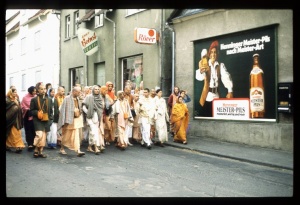CC Madhya 3.114 (1975): Difference between revisions
(Vanibot #0027: CCMirror - Mirror CC's 1996 edition to form a basis for 1975) |
(Vanibot #0020: VersionCompareLinker - added a link to the Version Compare feature) |
||
| Line 2: | Line 2: | ||
<div style="float:left">'''[[Sri Caitanya-caritamrta (1975)|Śrī Caitanya-caritāmṛta (1975)]] - [[CC Madhya (1975)|Madhya-līlā]] - [[CC Madhya 3 (1975)|Chapter 3: Lord Śrī Caitanya Mahāprabhu's Stay at the House of Advaita Acārya]]'''</div> | <div style="float:left">'''[[Sri Caitanya-caritamrta (1975)|Śrī Caitanya-caritāmṛta (1975)]] - [[CC Madhya (1975)|Madhya-līlā]] - [[CC Madhya 3 (1975)|Chapter 3: Lord Śrī Caitanya Mahāprabhu's Stay at the House of Advaita Acārya]]'''</div> | ||
<div style="float:right">[[File:Go-previous.png|link=CC Madhya 3.113 (1975)|Madhya-līlā 3.113]] '''[[CC Madhya 3.113 (1975)|Madhya-līlā 3.113]] - [[CC Madhya 3.115 (1975)|Madhya-līlā 3.115]]''' [[File:Go-next.png|link=CC Madhya 3.115 (1975)|Madhya-līlā 3.115]]</div> | <div style="float:right">[[File:Go-previous.png|link=CC Madhya 3.113 (1975)|Madhya-līlā 3.113]] '''[[CC Madhya 3.113 (1975)|Madhya-līlā 3.113]] - [[CC Madhya 3.115 (1975)|Madhya-līlā 3.115]]''' [[File:Go-next.png|link=CC Madhya 3.115 (1975)|Madhya-līlā 3.115]]</div> | ||
{{CompareVersions|CC|Madhya 3.114|CC 1975|CC 1996}} | |||
{{RandomImage}} | {{RandomImage}} | ||
==== TEXT 114 ==== | ==== TEXT 114 ==== | ||
<div class="verse"> | <div class="verse"> | ||
:ki kahiba re | :ki kahiba re sakhī ājuka ānanda ora | ||
:cira-dine mādhava mandire mora | :cira-dine mādhava mandire mora | ||
</div> | </div> | ||
| Line 18: | Line 17: | ||
<div class="synonyms"> | <div class="synonyms"> | ||
ki—what; kahiba—shall I say; re—O; | ki—what; kahiba—shall I say; re—O; sakhī—My dear friends; ājuka—today; ānanda—pleasure; ora—the limit; cira-dine—after many days; mādhava—Lord Kṛṣṇa; mandire—in the temple; mora—My. | ||
</div> | </div> | ||
| Line 25: | Line 24: | ||
<div class="translation"> | <div class="translation"> | ||
Advaita Ācārya said, | Advaita Ācārya said, " 'My dear friends, what shall I say? Today I have received the highest transcendental pleasure. After many, many days, Lord Kṛṣṇa is in My house.' " | ||
</div> | </div> | ||
| Line 32: | Line 31: | ||
<div class="purport"> | <div class="purport"> | ||
This is a song composed by Vidyāpati. Sometimes the word mādhava is misunderstood to refer to Mādhavendra Purī. Advaita Ācārya was a disciple of Mādhavendra Purī, and consequently some people think that He was referring to Mādhavendra Purī by using the word mādhava. But actually this is not the fact. This song was composed to commemorate the separation of Kṛṣṇa from Rādhārāṇī during | This is a song composed by Vidyāpati. Sometimes the word mādhava is misunderstood to refer to Mādhavendra Purī. Advaita Ācārya was a disciple of Mādhavendra Purī, and consequently some people think that He was referring to Mādhavendra Purī by using the word mādhava. But actually this is not the fact. This song was composed to commemorate the separation of Kṛṣṇa from Rādhārāṇī during Kṛṣṇa's absence in Mathurā. It is thought that this song was sung by Śrīmatī Rādhārāṇī when Kṛṣṇa returned. It is technically called Mathurā-viraha. | ||
</div> | </div> | ||
Latest revision as of 16:50, 27 January 2020

A.C. Bhaktivedanta Swami Prabhupada
TEXT 114
- ki kahiba re sakhī ājuka ānanda ora
- cira-dine mādhava mandire mora
SYNONYMS
ki—what; kahiba—shall I say; re—O; sakhī—My dear friends; ājuka—today; ānanda—pleasure; ora—the limit; cira-dine—after many days; mādhava—Lord Kṛṣṇa; mandire—in the temple; mora—My.
TRANSLATION
Advaita Ācārya said, " 'My dear friends, what shall I say? Today I have received the highest transcendental pleasure. After many, many days, Lord Kṛṣṇa is in My house.' "
PURPORT
This is a song composed by Vidyāpati. Sometimes the word mādhava is misunderstood to refer to Mādhavendra Purī. Advaita Ācārya was a disciple of Mādhavendra Purī, and consequently some people think that He was referring to Mādhavendra Purī by using the word mādhava. But actually this is not the fact. This song was composed to commemorate the separation of Kṛṣṇa from Rādhārāṇī during Kṛṣṇa's absence in Mathurā. It is thought that this song was sung by Śrīmatī Rādhārāṇī when Kṛṣṇa returned. It is technically called Mathurā-viraha.